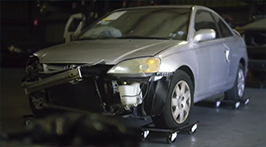Electrical Fire and Accident Statistics
According to the U.S. Consumer Product Safety Commission (CPSC), approximately 400 individuals are killed in the U.S. each year as a result of electrical shocks and electrocution accidents in the home. The National Fire Protection Association estimates that on average, 53,000 residential electrical fires occur yearly, leading to more than 450 deaths, 1,400 injuries, and at least $1.4 billion in property damage.
Many accidents result from misuse of electrical outlets, with almost 4,000 injuries reported yearly. One-third of these injuries occur when young children insert objects such as keys, safety pins, or hairpins into wall outlets. Electrical shocks can cause severe muscular contractions, nerve damage, cardiac arrest, severe burns, and even death from electrocution.
Electrical Safety Tips
The CPSC recommends inspecting all electrical products in the home every six months. With the proper safety measures and precautions, the majority of home fires and electrical fire deaths are preventable.
Keep in mind the following tips to ensure your home is safe from electrical fires:
- Use only appliances, extension cords, and surge protectors listed by Underwriters Laboratories (UL) or other nationally-recognized testing facilities
- Throw away appliances that spark, smoke, overheat, or deliver a slight electrical shock when touched
- Have your home inspected by a qualified electrician
- Keep liquids away from electronics, appliances, and outlets, and never touch electrical devices with wet hands
- Use heavy-duty cords for high-wattage appliances
- Replace all two-hole outlets with three-hole, grounded outlets
- Unplug small appliances when not in use
- Use safety covers on unused outlets to protect children from electrical shocks
- Install GFCIs (ground fault circuit interrupters) on all outlets and breakers to prevent electric shocks and fires, especially around pools, spas, and hot tubs; test GFCI outlets monthly
Hazardous Electrical Products
Electrical products are often recalled by the CPSC if they are found to be unsafe, but often it is too late. The following products and devices can be particularly dangerous, especially if the device is faulty or misused:
- Hairdryers
- Electric blankets
- Portable heaters
- Extension cords and surge protectors
Hair Dryer Dangers
The CPSC recommends that consumers buy hair dryers that comply with certain safety standards, effective in January 1991, that add protection against electrocution if the dryer falls into water. Choose hair dryers with large rectangular plugs and certification marks from a well-known testing laboratory, and never use hair dryers near water.
Electric Blanket Dangers
Electric blankets can easily overheat and cause a fire if items are placed on top of the blanket while in use. Blankets should be discarded if wiring is cracked or broken, or if dark, charred, or frayed spots are noticed.
Portable Heater Dangers
When using portable heaters, or space heaters, keep at least three feet between the heater and any flammable materials, such as papers, curtains, or beds. Portable heaters should never be used near water or in bathrooms, and they should be plugged into GFCI outlets only.
Extension Cord Dangers
Extension cords cause an estimated 4,000 injuries, 50 deaths, and 3,300 residential fires each year. Extension cords should never be used on a permanent basis, as they are intended for temporary use as-needed. Residential fires can occur if the cords are faulty, overloaded, damaged, or misused. Young children have been known to put extension cords in their mouths, which can result in electrical burns to the mouth or more serious injuries.
Keep in mind the following tips when using extension cords:
- Always use polarized cords
- Cover unused outlets with electrical tape or plastic caps
- When disconnecting cords, pull from the plug, not cord
- Use heavy-duty cords for high-wattage appliances
- Never run electrical cords under rugs or next to walls where heat can build up
Sources:
